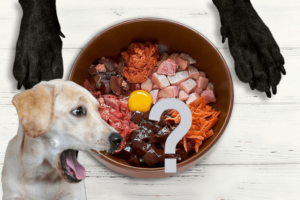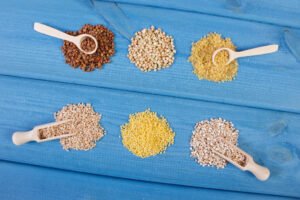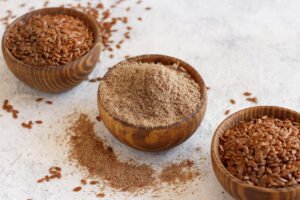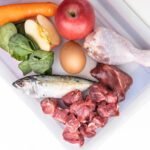Opting for a raw diet for your dog involves a commitment to providing nutrition that mimics what canines have historically consumed. However, even the most carefully planned raw diet may lack certain nutrients essential for optimal health. This is where supplements play a vital role, ensuring that your dog receives a balanced and complete nutritional profile. Let’s delve into the essential supplements that can enhance the health benefits of a raw diet for dogs.
If you’re new to the concept of raw feeding, our The Ultimate Guide to Starting Your Dog on a Raw Diet offers a comprehensive overview, helping you understand the fundamentals before diving into supplementation
1. Bone Meal or Calcium Supplements
Why It’s Needed: Raw diets often rely on bones to supply calcium, crucial for bone health and various metabolic functions. However, if the diet does not include enough edible bones or if your dog cannot consume them due to dental issues or preferences, a calcium supplement becomes essential to prevent deficiencies.
Recommended Form: A high-quality bone meal supplement or a veterinarian-approved calcium supplement specifically designed for dogs is preferable to ensure proper calcium-to-phosphorus ratios.
To learn more about the importance of calcium in your dog’s diet and how it supports their overall health, check out Doggy Diets: Understanding Caloric Needs for Your Furry Friend. This article discusses the role of essential minerals in canine nutrition.
2. Omega-3 Fatty Acids
Why It’s Needed: Omega-3 fatty acids, particularly EPA and DHA, support brain function, reduce inflammation, and improve coat health. While some raw diets may include fish, additional supplementation can be beneficial, especially for dogs with allergies or inflammatory conditions.
Recommended Form: Fish oil supplements or algae-based omega-3 supplements designed for pets can provide the necessary fatty acids without the risk of heavy metal contamination found in some fish.
3. Vitamin E
Why It’s Needed: Vitamin E is a crucial antioxidant that helps protect against oxidative damage and supports skin and immune health. Since many raw diets may not provide enough vitamin E, supplementation can help fill this gap.
Recommended Form: A natural vitamin E supplement (look for “d-alpha-tocopherol” on the label) is preferred over synthetic forms.
4. Vitamin D
Why It’s Needed: Vitamin D is essential for calcium absorption and bone health. Dogs cannot synthesize enough vitamin D from sunlight, and certain raw diets, especially those low in fish, may lack sufficient vitamin D.
Recommended Form: A dog-specific vitamin D supplement can ensure your pet receives the necessary amount, as excessive vitamin D can be toxic.
5. B Vitamins
Why It’s Needed: B vitamins are vital for energy metabolism, nerve function, and overall health. While meat is a good source, dogs on a raw diet may still benefit from supplementation, especially B12, which can be deficient in some diets.
Recommended Form: A comprehensive B complex supplement designed for dogs can cover all essential B vitamins.
6. Probiotics
Why It’s Needed: A healthy gut flora is essential for digestion and immune health. Raw diets do promote gut health, but adding a probiotic supplement can further support the digestive system, especially during the transition to raw feeding or for dogs with gastrointestinal issues.
Recommended Form: A canine-specific probiotic supplement with multiple strains of beneficial bacteria.
o understand the impact of probiotics beyond allergy management, refer to The Role of Probiotics in Managing Dog Allergies. This piece provides a detailed look at how probiotics contribute to overall health, particularly in addressing allergies.
7. Zinc
Why It’s Needed: Zinc plays a critical role in skin health, wound healing, and the immune system. Some dogs, particularly those on raw diets high in red meats, may require additional zinc due to its poor bioavailability in certain foods.
Recommended Form: A chelated zinc supplement for dogs ensures better absorption and minimizes the risk of deficiency.
Consulting a Professional
Before introducing any supplements into your dog’s raw diet, consulting with a veterinary nutritionist is essential. They can provide tailored advice based on your dog’s specific dietary needs, health status, and any existing conditions. This personalized approach ensures that your dog benefits fully from the raw diet while addressing any nutritional gaps through appropriate supplementation.
Considering a raw diet or supplements for your dog should always be done under professional guidance. The Basics of Holistic Health Care for Dogs: An Introduction emphasizes the importance of consulting with veterinary professionals when exploring holistic health options, including diet and supplementation.

























